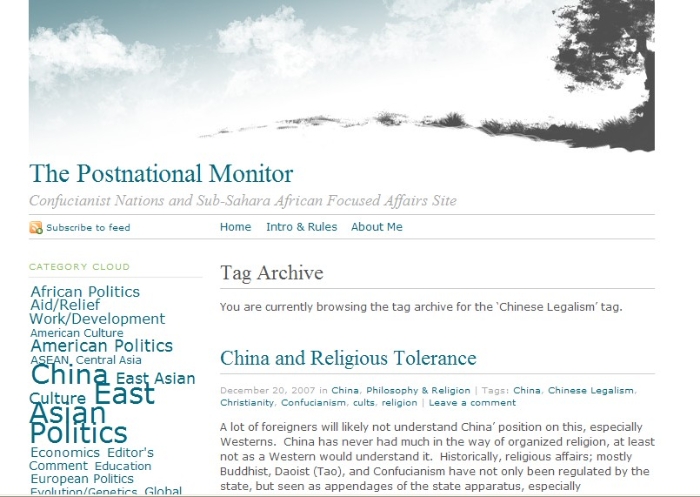A lot of foreigners will likely not understand China’ position on this, especially Westerns. China has never had much in the way of organized religion, at least not as a Western would understand it. Historically, religious affairs; mostly Buddhist, Daoist (Tao), and Confucianism have not only been regulated by the state, but seen as appendages of the state apparatus, especially Confucianism. Many Confucian philosophers were state officials. I should emphasize that to call Confucianism and Buddhism "religions" is stretching the Western meaning a bit, due to the fact they are both"god-less".
Much of China’s philosophical history is firmly grounded in the practical application of virtue and harmony as it relates to man with the family, government, and nature. Governmental philosophy, at least since the time of Meng Zi (Mencius: 372-289 BCE) has been a mix of Chinese Legalism and state promoted Confucianism: A balance of strict, almost Machiavellian, rule of law and ritualistically enforced moral virtue. The Chinese seemed to believe that if the state is virtuous, the people will also be, which will weaken the need for laws and punishment; creating harmony. This virtue was achieved by ritual and strong bonds between a person and their family and the family and the state. If this was achieved, Kong Fuzi believed there was no need to emphasize the gods, as they will only intervene in daily life when the state lacks virtue, which will lead to disharmony "under heaven" and general "luan" (chaos).
When the government could no longer maintain this balance, then it lost the "Mandate of Heaven" and would be replaced. This is a cycle in Chinese history, often a bloody one. So the Chinese government was never "by the people" but it was "for the people", or supposed to be. That is a simplified version, but I think that gives an idea, but it is interesting to note that the Chinese came to the conclusion of "just revolution" over 1,500 before Westerns. Chinese saw it as part of the regular flow of things, seeing the world more cyclic then linear. They also seemed to be the first to come up with a proto-libertarianism, which is one interpretation of Daoism. Another interpretation would be that the virtuous end goals of Confucianism are one with Dao, so it is just a subset.
All that being said, organized religions; separated from the state, often resulted in violent rebellions in China. The worst of these was the Taiping Rebellion (Great Peace Rebellion) , in the mid-19th century. Some 20 million people died. There have been similar (although less costly) rebellions of Muslims in the Western provinces as well. For this reason Chinese governments have historically been suspicious of cults, secret societies, and organized religions. These types of groups are seen as not promoting harmony, but factionalism, which will lead to instability.
Western people might feel that in 2007 this is unreasonable, but they also do not live in China and rarely understand Mainland Chinese culture. I think, as China develops socially and economically there will be less fear of this sort of thing and things will liberalize. At this point the Chinese government is primarily concerned with national stability and economic development, which are deeply interconnected. Being that China has thousands of mini-uprising a year I do not believe they will do anything they feel will increase create more instability. This also explains the Chinese response to Falun Dafa (Falun Gong), which I also believe is a cult. So in the end, the concept of "separation between church and state" as in the American constitution, is very alien to Chinese culture. I believe that Taiwan and Singapore show that it does not have to be once a certain standard of development is reached. Even if there was absolute religious freedom in China, I believe the people have a cultural aversion to Western religions, as I have talked about before. Out of all the Confucian-based societies in Asia, only S.Korea has a significant amount of Christians, although all the societies have been exposed to Christianity and Islam for some time. Japan, for example, has a Christian population of less than 1% after 500 years of contact.
About the author
I am a 30 something year old African American male. I have lived half my life in the American Midwest and another half in the Southeast. I earned a Master of Liberal Arts Degree in International Studies at a university in Texas. Prior to this, I completed two Bachelors of Science in International Business and Information Technology in Virginia.
After graduating I lived and worked in Tokyo, Japan as an English teacher and IT contractor from 2001-2002. My overseas experiences also include a semester studying Mandarin Chinese at the Shanghai International Studies University in 1999. I have also traveled to several other nations including Taiwan, South Korea, and Switzerland. I’m presently living in eastern Switzerland (Ostschweiz or Deutschschweiz)
I am also highly interested in European and East and Southeast Asian political economic environment; however, I follow a wide variety of topics to include, but not limited to history, population genetics, and sociology.
(Wordpress.com, December 20, 2007)

Original text from: http://pmsol3.wordpress.com/tag/chinese-legalism/